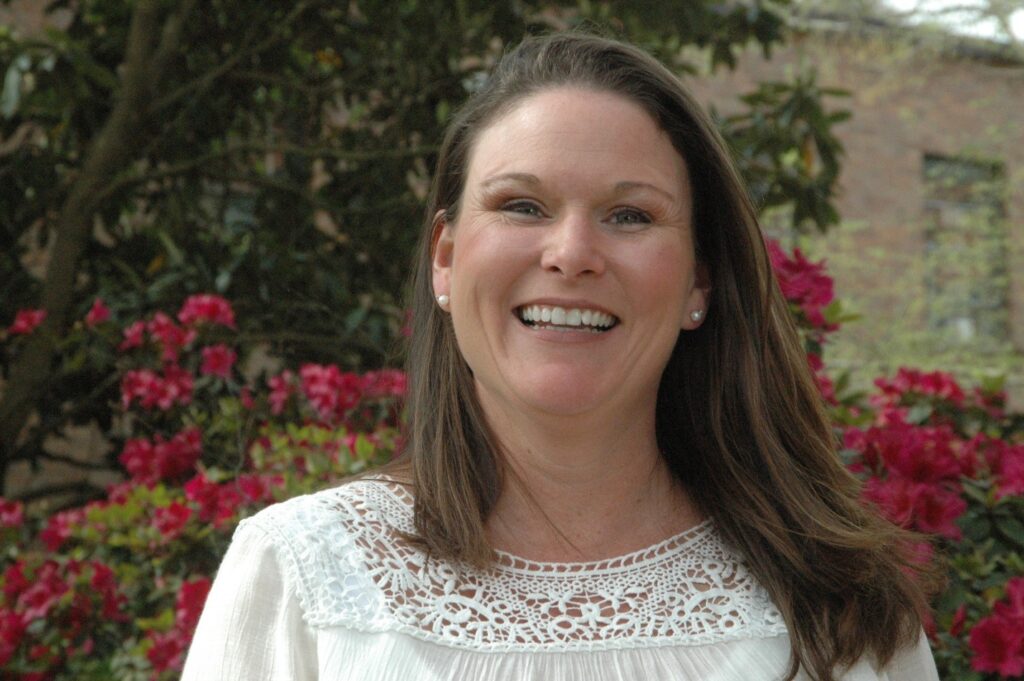
Dr. Heather Kirk-Ballard is an Extension Specialist and Assistant Professor of Sustainable Urban Landscapes in the Department of Horticulture at the University of Georgia.
Integrating Health, Beauty, and Sustainability: Small Fruits in Edible Landscapes
Hello! I’m Dr. Heather Kirk-Ballard, Extension Specialist and Assistant Professor of Sustainable Urban Landscapes in the Department of Horticulture at the University of Georgia. My work is grounded in the belief that landscapes should be more than beautiful—they should be functional, resilient, and nourishing. One of the most exciting ways to achieve this is through the integration of small fruits into edible landscapes.
With a strong background in medicinal plants and plant-based wellness, I’ve long been fascinated by the connection between what we grow and how it supports human health. I teach courses such as Herbs, Spices, and Medicinal Plants and Sustainable Landscape Maintenance and Design, where students explore not only plant biology and ecology, but also the practical applications of designing spaces that support both people and the planet. In these classes, small fruits frequently emerge as standout examples of plants that are as nutritious as they are beautiful.
Small fruits—like blueberries, blackberries, strawberries, muscadines, elderberries, and raspberries—are rich in antioxidants, polyphenols, fiber, and vitamins that have been shown to support immune function, reduce inflammation, and help prevent chronic disease. These fruits are excellent candidates for edible landscaping, offering high medicinal and nutritional value while also enhancing biodiversity and supporting pollinators. They’re compact, manageable, and versatile—perfect for home gardens, schoolyards, urban greenspaces, and even commercial landscapes.
One of my main goals in both research and outreach is to show how these fruits can be integrated into sustainable designs that meet environmental, aesthetic, and community needs. My Extension efforts include creating educational materials, demonstration gardens, and hands-on workshops that teach how to successfully grow small fruits in urban and suburban environments with minimal inputs. We focus on cultivar selection, soil health, integrated pest management, and design strategies that maximize space and ecological function.
A key part of sustainability that I also emphasize is reducing food waste and promoting composting practices. Whether it’s integrating compost systems into home gardens or teaching best practices for food scrap collection and reuse, I believe that closing the loop between what we grow, consume, and return to the soil is essential. Small fruits tie into this beautifully—offering seasonal harvests that can be preserved or shared, and any spoiled fruit or trimmings can be composted to build soil fertility.
I’m currently developing Extension programming that highlights the synergy between edible landscaping, food waste reduction, and composting. For example, I’m interested in showing how fruit-bearing plants can be incorporated into community garden designs that include composting systems, educational signage, and accessible harvesting strategies to reduce spoilage. These practices can help reduce landfill burden, build healthier soils, and engage the public in meaningful sustainability efforts.
Another area I focus on is student and workforce development. I advise students in horticulture and serve as the advisor for the National Collegiate Landscape Competition team. My goal is to prepare students not only with technical skills, but with an understanding of how plants like small fruits can be central to regenerative, health-forward landscape design. We emphasize hands-on learning, real-world applications, and interdisciplinary thinking.
Small fruits offer a unique opportunity to connect people to plants. Whether they’re grown as living borders, privacy screens, foundation plantings, or focal points, these fruits offer beauty, habitat, and nourishment. And by pairing them with thoughtful composting and food waste strategies, we can create landscapes that are truly circular—where nothing is wasted and everything contributes to the greater ecological system.
If you’re working on small fruit research, production, education, or community outreach—or are simply interested in exploring how small fruits can be more fully embraced in landscape design—I’d love to hear from you. I’m especially interested in collaborative efforts around edible landscaping, compost integration, native cultivar selection, and sustainable urban planning.
You can reach me at Heather.KirkBallard@uga.edu. Let’s grow resilient, healthier landscapes.